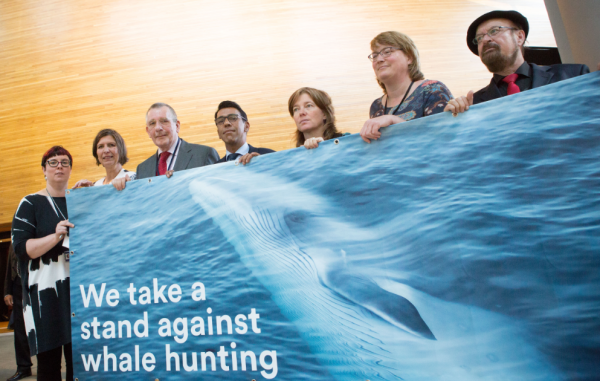البرلمان الأوروبي: يجب على النرويج التوقف عن صيد الحيتان
ترجمة: ن. ط
أيد، الأسبوع الماضى، البرلمان الأوربى اقتراحا للحزب من أجل الحيوان يدعو النرويج إلى إنهاء الصيد التجارى للحيتان. كذلك يريد البرلمان الأوروبى منع نقل لحوم الحيتان النرويجية عبر الموانىء الأوروبية في اتجاه اليابان.
“بيان البرلمان الأوروبي هذا يزيد الضغط الدولي على النرويج. صيد الحيتان يعتبر شيئا مروعا ويشكل خطرا على بقاء هذه الحيوانات المثيرة الإعجاب”، تقول أنيا هازيكامب عضوة البرلمان الأوروبي (الحزب من أجل الحيوانات)
لقد تم حظر صيد الحيتان في جميع أنحاء العالم منذ عام 1986، لكن النرويج واليابان وأيسلندا يرفضون الإلتزام بهذا الحظر. منذ الحظر 1986، قتلت النرويج ما يزيد عن 13 ألف من الحيتان؛ وتريد في هذه السنة قتل 999.

عضوة البرلمان الأوروبي أنيا هازكامب PvdD تظهر مع زملائها موقفهم ضد صيد الحيتان
ويدعو البرلمان الأوروبي النرويج الرضوخ للحظر الدولي والتوقف نهائيا عن صيد الحيتان. غير أنه لا يمكن فرض حظرا إلزاميا لأن بلد النرويج ليس عضوا في الإتحاد الأوروبي.
ومع ذلك، يمكن لبروكسيل أن تضمن حظر شحن لحوم الحوت النرويجية عبر موانئ الاتحاد الأوروبي في اتجاه اليابان. و بما أن شراء وبيع منتجات الحيتان محظور في الاتحاد الأوروبي، فإنه يمكن إبعاد شحن لحوم الحوت عبر موانئ الاتحاد الأوروبي. فتحة في القانون، يتم استخدامها بشجع؛ على سبيل المثال، في أكتوبر 2016، تم إبعاد شحن 3000 كلغ من لحوم الحوت النرويجية إلى اليابان عبر موانئ في ألمانيا، فرنسا ومالطة. وتحذر المنظمات البيئية من أن صادرات النرويجي للحوم الحوت تزداد باطراد.
حاليا يريد الحزب من أجل الحيوانات فرض حظر شامل على شحن منتجات الحوت عبر موانئ الاتحاد الأوروبي ويجد نفسه مدعوما من طرف البرلمان الأوروبي. “حظر صيد الحيتان قد تم أزيد من ثلاثين عاما. ولذلك فإنه لمن المتناقض مساعدة البلدان، التي تضرب الحماية الدولية عرض الحائط، في نقل تلك المنتجات. حظر الشحن يصعّب التجارة في منتجات الحيتان ويثبط بالتالي الصيد أيضا”. حسب PvdD آنيا هازيكامب عضوة البرلمان الأوروبي.
والآن وبعد أن أيد البرلمان الأوروبي اقتراح الحزب من أجل الحيوانات، يترك الأمر إلى المفوضية الأوروبية و الـ 28 دولة بالإتحاد الأوروبي لتقرير ما إذا كان الحظر على صيد الحيتان سيتحقق بالفعل.
Last week, a majority of the European Parliament has supported the Party for the Animals’ motion urging Norway to cease its commercial whaling operations. The EU also wants to ensure that whale meat is no longer transported to Japan through EU ports.
“The EU´s verdict puts additional pressure on Norway. Whaling is cruel and constitutes a danger to the existence of these magnificent creatures,” says MEP Anja Hazekamp (Party for the Animals).
Norway, Japan and Iceland refuse to uphold the global whaling ban that came into effect in 1986. Since the ban came into effect, Norway has killed over 13,000 whales, and plans on killing 999 more this year.

Party for the Animals MEP Anja Hazekamp and her colleagues take a stand against whaling
MEPs urge Norway to abide by the International Whaling Commission moratorium and to finally cease its whaling operations. The European Parliament cannot impose a legally binding ban, as Norway is not a member of the EU.
However, Brussels can make sure that Norwegian whale meat is no longer transported to Japan through European ports. Although the buying and selling of whale products is illegal in the EU, transporting whale meat through EU ports is still allowed. A loophole, and one that is eagerly exploited. For instance in October 2016, when just under 3,000 kilos of Norwegian whale meat was shipped to Japan through ports in Germany, France and Malta. Environmental organisations warn that the export of Norwegian whale meat is steadily rising.
The Party for the Animals, supported by the European Parliament, wants a total ban on the shipment of whale products through EU ports. “Whaling has been prohibited for over thirty years. Offering our help with the transport of whale products to countries that disregard international protection measures, is contradictory. A ban on transit will make the trade in whale products more difficult and thereby discourage whaling itself,” according to Party for the Animals MEP Anja Hazekamp.
Now that the European Parliament has supported the Party for the Animals’ proposal, it is up to the European Commission and the 28 EU member states to decide whether there will be an actual ban on transit of whale products.